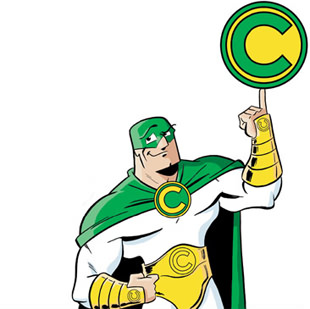Copyright

Deep in the Desedo laboratory, our caldron bubbles. Wondering about copyrights, we asked a legal friend and he said the below. Succinct and smart, so we’ll share:
You can only copyright expressions and not ideas. Ideas are free, but the creative expression of ideas benefit the public so much that the government is willing to give a monopoly to the expression’s creator. What this means here is that the first you must do is to never say that you want to own the idea. That is untenable.
And in order for an expression to be copyrightable, it must be fixed in some tangible medium (on paper, on video, in computer code…). The medium that it needs depends upon what it is that you are trying to copyright. It is okay for a composer to write down the notes of a song, or a choreographer to write down dance steps, and then copyright that piece, but your expression may need something more than just paper fixation.
For example:
A person writing down the idea to have the interaction between the computer and the user to be graphically based with certain icons representing certain tasks, thus alleviating the need for all users to use typed commands is not copyrightable because it is an idea; but when someone writes a program that actually performs that function, then the idea has been expressed in a fixed form, with the code being the fixation. Your idea requires for the code to be written – that is a viable expression.

Now, if the technology already exists for your expression to come into fruition, you can simply compile that already fixed technology into a package and copyright the compilation. The trick is that you must actually compile it into a functioning compilation. The analogy would be if I wanted to publish a compilation of ancient Roman bed time stories, I would first have to actually gather all of the stories (I chose ancient Roman because they would all be in the public domain already) and put them in order and add whatever commentary I wanted to add before I registered my copyright. Now this copyright would only protect the unique expressions:
My added commentary (because it is truly original and fixed) and the order and arrangement of the stories (not the stories themselves).
If I wanted to compile stories that were actually still protected with valid copyrights I would have to transform them some how (like via parody) so that the transformative elements could be copyrightable and I would not have to pay the original copyright owner any royalties. (Spaceballs/Star Wars)
So with this in mind for any tech based content, one approach is to create the program with public domain software (like RedHat) that can handle everything you need, as it is difficult to prove a transformative use on someone else’s software.

Dive deeper? Here is Lawrence Lessig on Charlie Rose.

Comments:
nice succinct overview!
worth mentioning that copyright is granted implicitly upon fixing the expression to a medium. no need to register with copyright.gov or anything like that.
sometime, you’ll have to geek out with the gnu project to see what hacking copyright can do: http://www.gnu.org/philosophy/philosophy.html